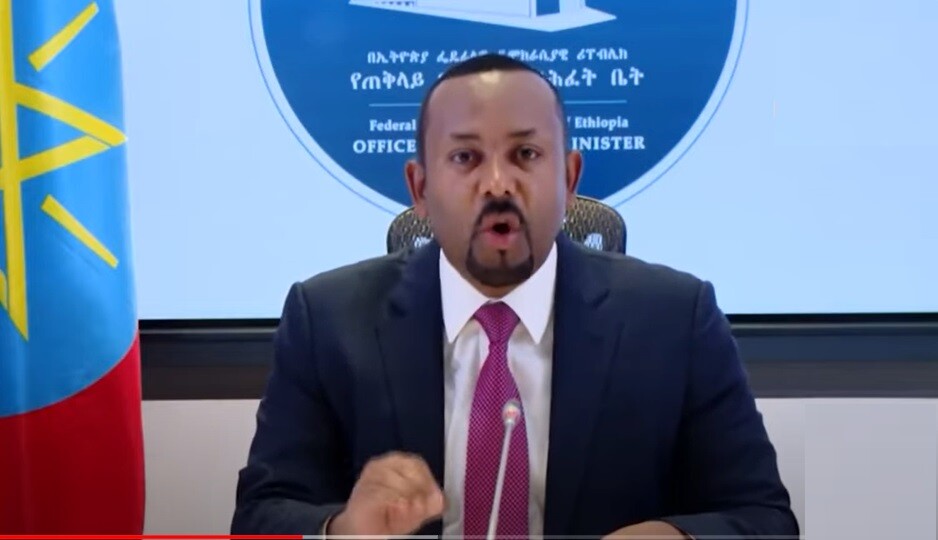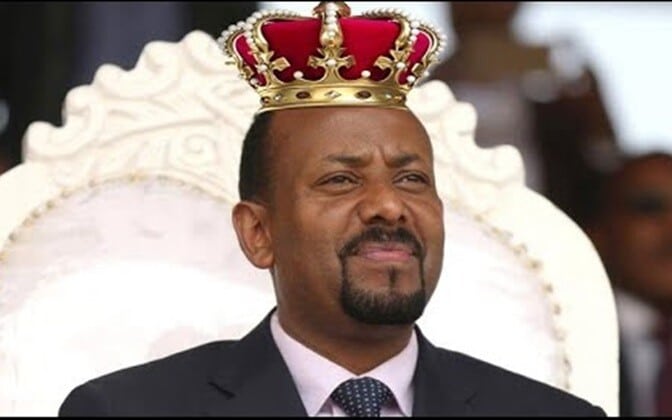
In my recent postings on this platform, I have touched on several topics pointing to the responsibilities of the leadership and the population to safeguard and improve the security, integrity, and stability of Ethiopia. I tried my best to avoid pointing accusing finger at any individual or entity, but encouraging all concerned to look at their own roles and see how they can improve their contributions.
Historically, Ethiopia has presented all sorts of challenges to her leaders and citizenry. The outcomes very much depended on the personality-traits of the leaders, environmental factors and opportunities which availed themselves. After the difficult experiences under the last three regimes, Ethiopians and the world were very hopeful with the arrival of the current administration under the leadership on PM Abyi Ahmed Ali. But, over the last 5 years the nation’s journey has gone from hopeful to despair, from trust to distrust, and the PM’s image has gone from trustworthy to untrustworthy. In the eyes of the world, he has gone from apparently honest person with integrity to a hypocrite! These sound harsh judgements on anyone, but we must face facts and be open about it, otherwise Ethiopia, the beacon of Africa’s freedom, will lose respect across the globe, and may even disintegrate if it remains on its current path!
In 2008 I sent an open letter to PM Meles pointing out in detail about his maladministration which posed danger not only to people he considered enemies but also to his own family and his Tigray community. I pleaded with him to change course for the benefit of all. Of course, he did not do anything to mend his ways and today Tigray people continue to suffer the pains his and the subsequent regional administration inflicted on them!
Several months ago, I posted an article which I published 4 months after PM Abyi came to power. The article was entitled: Ethiopia’s Renaissance – The Cradle of Mankind. In the article, I warned about risks of the population not taking the responsibility to make sure the opportunity of the new dawn for Ethiopia’s democracy and rule of law was not lost by leaving all the tasks on the shoulders of the Prime Minister. I also gave suggestions for creation of the Administration of National Unity to eradicate the poison of ethnic divisions created by the previous administration. Again, the warnings were ignored, and Ethiopia is back in chaos, only this time the crisis is much worse than what the country had experienced before!
Another opinion I shared on this platform is the fact that humanity made progress to where we are based on the WIN-WIN strategy at every level of human interaction. That is people working together so that everyone benefits. The I WIN-YOU LOSE, strategy is doomed to fail, and eventually everyone ends up losing. The history o Ethiopia’s inter-ethnic conflicts are excellent examples of this view. In another article, I also discussed the definition of insanity (madness) as defined by Albert Einstein, that is, repeating same action over and over again and expecting a different outcome! So, whether it is TPLF vs Ethiopia, Oromo vs Amara, Amara vs Tigray, Ethiopia vs Eritrea or Ethiopia vs Somalia, the outcome is invariable LOSE-LOSE in the end, and it’s insane to expect otherwise!
The purpose of this article is to point out our frailties as human beings, and how people can work together to achieve goals higher than individual gains. By making these emphases, we are not only protecting Ethiopia and the population at large, but also protecting individuals from hurting themselves out of lack of understanding the dynamics human interactions and the consequences of their actions. I have focused on PM Abyi in this article because he is the head of Ethiopia’s government and has to take responsibility for the situation the country is in today! We all must understand that protecting Ethiopia and making sure the future is brighter for the future generation is the responsibility of ALL Ethiopians. Sitting thousands of miles away from Ethiopia and regularly pointing accusing fingers at Ethiopia’s leadership does not help to bring the nation together but is tantamount to pouring gas into an inflammatory situation, and that is the definition of irresponsible behavior! We all must accept our responsibilities.
Craig Nathanson PhD. described 15 most important personality-traits of effective leaders.
Nathanson said, and I quote: “Close your eyes and imagine a leader. Did you think of a general? The president? It’s not unusual to associate leadership with power but to gauge effective leadership, I’d argue that power will only take you so far on the battlefield, in the Oval Office, and, yes, even in the workplace. In order to achieve sustainable success, managers need to embrace a humanistic model, which emphasizes compassion, the value of each individual, and respect.”
I’ll pick some of Nathanson’s list of traits which reveal those of the current Ethiopian PM Abyi Ahmed Ali.
OPENNESS AND FRIENDLINESS
People appreciate and will react more positively when they feel they can trust their leader, communicate in an open way, and not fear saying the wrong thing. A strong leader is one that people feel comfortable interacting with, knowing they will get an honest answer.
The humanistic leader is sociable, easy to talk, and relatable.
My comment: A friend recently told me that she does not trust PM Abyi because he does not come across as an honest person! While she has never met him in-person, she observed that he did not look directly at the person he talks to – his eyes wandering all over the place which defines dishonesty, in her judgement!
THOUGHTFULNESS
People are able to enjoy their work more and, thus, are more productive when their leader respects and incorporates their views. Thinking of others and, often, putting their needs first helps a leader gain trust and loyalty.
The humanistic leader shows empathy and is able to put themselves into the shoes of the people they lead.
My comment: PM Abyi’s treatment of his Minister for Peace, Mr. Taye Dendea, demonstrates the opposite of what a thoughtful leader would do.
EMOTIONAL STABILITY
Emotions at work shift throughout the day, yet people expect leaders to be stable emotionally throughout the day. This, in turn, sparks emotional stability with the team members, and work gets done more effectively.
The humanistic leader is emotionally resilient.
My comment: PM Abyi has seen multiple internal conflicts in Ethiopia, yet while preaching peace and unitary Ethiopia, his actions seem to divide the nation along ethnic lines, and now even going beyond Ethiopia and causing instability in the Horn of Africa. This is far from being an emotionally stable leader!
CREATIVITY
People require new ideas and insight from their leaders to thrive at work. A creative mind that can think outside of the box is highly effective in the workplace.
Humanistic leaders are capable of thinking from different perspectives, systems thinkers, deep thinkers, and full of imagination and new possibilities!
My comment: Today, looking at Ethiopia generally, one wonders if there is a functional government! People get robbed in broad daylight in the streets of Addis Ababa, people are afraid to travel because of fear of being robbed or killed, even international organizations like the African Development Bank are not safe from attack by the security forces!
EFFECTIVE COMMUNICATORS
People readily follow leaders who can clearly explain what they want and expect through written, spoken, and non-verbal communication avenues. Strong leaders are able to connect with people through clear and honest communication.
The humanistic leader knows how to state their goals in a way people can understand.
My comment: As the title of this piece clearly states, saying one thing and doing the opposite is what seems to have change the world’s view of PM Abyi from an apparently honest man to a hypocrite. While preaching Ethiopia as one nation and its population as one people, he appears to be actively supporting one ethnic group’s dominance over the others. He preaches about prosperity and showcases them by visiting tourist destinations, farms using modern equipment, but hardly ever mentions about people dying from internal conflicts, starvation, and internal displacements of the population.
INTEGRITY
Being honest, reliable, and trustworthy are all critical to leaders because people are more likely to follow those they feel they can fully trust. Being a person of integrity means being someone who stands behind his/her word and shows up when he/she says he/she will—this trait shows the people under him/her that they can trust him/her not only professionally, but also personally.
The humanistic leader is truthful in every interaction with the people they lead, and these builds trust within teams.
My comment: These are the elements which PM Abyi seems to lack, and impossible to gain at his age and inherent mindset!
SELF-AWARENESS
To lead others, a leader must be aware of their own needs, strengths, and shortfalls, and demonstrates this by taking measures to improve when needed. Only through self-awareness will leaders be empowered to make changes to become stronger leaders. Others respond well to those who are aware of their own personality traits and how they affect others.
The humanistic leader is in touch with their own person, and they use that self-awareness to better impact others around them.
My comment: PM Abyi had and continues to have so many opportunities to learn from his deficiencies and correct course to protect himself, the population, Ethiopia, and the region of HoA. Unfortunately, he seems to lack self-awareness, and that has contributed to the dire state Ethiopia and the region is in today!
EMPATHY
Being able to understand and respond to the emotions and experiences of others creates a strong, personable leader. Empathy is vital to building strong connections with team members, and those connections help the leader accomplish more.
Humanistic leaders respond to the emotions and experiences of others with empathetic understanding, and they use that empathy to make better decisions that affect the team.
My comment: Do not expect that from PM Abyi! His own supporter, the former Minister for Peace, Mr. Taye Dendea, expressed disagreements with the PM’s handling of the chaos in Ethiopia. Instead of empathy and discussing way forward, the Minister was kicked out of office, and put in jail!
ENGAGED
An engaged leader is actively interacting with team members throughout the day. This leader knows what is happening in their people’s lives, how they are doing on their projects, and what could happen to make things flow more freely throughout the day.
The humanistic leader is an active and engaged participant in the work that is happening, and this leader is not afraid to get their hands dirty with the daily work.
My comment: Only his Ministers and junior officers working with PM Abyi can explain these elements of his leadership fully and in detail but watching him on TV giving lectures in the Parliament other venues does not give the impression of a leader who doen’t in the mad and work with his team to make projects work, as demonstrated by his treatment of Mr. Taye Dendea.
HUMOROUS
Being too serious can be detrimental when leading a team. Laughter raises the spirits of people in an organization, even during stressful or challenging times. Humor allows a leader to see the bright side of anything that happens, even if something negative takes place. People respond well to appropriate humor.
Humanistic leaders understand and embrace the power of laughter through appropriate and timely humor, which can help lessen stress and improve overall morale.
My comment: Humor cannot come alone to smoothen work-relationship, all the above have to be part of healthy relationships.
PASSIONATE
Leaders who are passionate about their mission are able to communicate a clear vision to the people they lead. That passion can lead to a charismatic approach that people respond well to. They are excellent at communicating the purpose behind their actions, and that passion can spread to others.
Humanistic leaders have a strong passion for what they do, and they can convey that passion to the people they lead.
My comment: The vision PM Abyi shares in public and the Mission he appears to foster and is passionate about, are diametrically opposed to each other! He has managed to soldier on, on this path because obviously those around him share the same mission, but that mission is to the detriment of ALL Ethiopians and Ethiopia, Herself!
RESPECTABLE
Respect is earned, and the integrity and passion of a strong leader is something that people will respect when it is delivered with openness and empathy. By embracing these character traits, leaders will gain the appreciation of those they lead. These leaders carry themselves in such a way that they demand and command respect from those around them.
In every action and reaction, humanistic leaders live a respectable life.
My comment: Whether it is the campaign to revoke the Nobel Price he was bestowed with in 2018, campaign against his policies through the legislatures in the West, demonstration in the streets across the globe, or the plight of Priests from the Pulpit, there is no respect for PM Abyi! And that is because his apparent previous honesty has given way to hypocrisy in the judgements of all honest people who had trusted him!
ACCOUNTABLE
Leaders who excel at what they do understand the importance of holding themselves accountable for their actions. Either through others who are in leadership over them or with accountability to their own teams, good leaders will check in with others to ensure they are attaining their goals well.
Humanistic leaders understand the value of accountability, and they hold themselves, not just their teams, accountable for their own successes.
My comment: Leaders who understand and care about accountability are those who would speak loudly about their failures and explain what they have done and how to remedy them. Ethiopia is split along inter and intra-ethnic lines, young people, women, and children are dying every day because of war and starvation. I have not heard PM Abyi speak about these issues or take responsibility in any way!
ETHICAL
Ethical leaders believe in the dignity and value of others and will push to protect them throughout the work of the organization. Ethical behavior flows through every decision, and these leaders will push for actions that protect the common good.
Humanistic leaders have strong ethical values and use those values to drive their own decision-making.
My comment: Everything that Craig Nathanson listed tells us there is serious lack of ethical values in PM Abyi’s conduct. Unfortunately, it is not something which can be reversed. Five years are more than enough time to demonstrate one’s values, and for PM Abyi, it’s all downhill hence!
Nathanson asks – WHY IS EFFECTIVE LEADERSHIP IMPORTANT?
Here are some key reasons why effective leadership is essential:
- Inspiring and motivating others: Effective leaders can motivate individuals to work towards a common goal. They provide a vision, set clear objectives, and communicate effectively to create a sense of purpose and enthusiasm among their team members. This helps boost morale, increase productivity, and foster a positive work environment.
- Guiding and supporting teams:Leaders provide guidance, support, and direction to their teams. They help identify and utilize individuals’ strengths, assign tasks appropriately, and promote collaboration. Through their experience and expertise, they offer valuable insights and advice, ensuring that the team stays on track and overcomes obstacles.
- Driving innovation and adaptation:Effective leaders encourage innovation and adaptability within their teams and organizations. They create an environment that embraces change and encourages the exploration of new ideas. By fostering a culture of creativity, experimentation, and continuous learning, leaders enable their teams to adapt to evolving challenges and seize new opportunities.
- Building trust and fostering teamwork: Trust is fundamental to effective leadership. Leaders who demonstrate integrity, honesty, and transparency gain the confidence and respect of their team members. When trust is established, individuals feel safe to express their ideas, take risks, and collaborate openly. This leads to more vital teamwork, improved communication, and enhanced problem-solving capabilities.
- Developing future leaders:Effective leaders invest in developing their team members and nurturing their skills and talents. They provide growth opportunities, delegate responsibilities, and offer guidance and feedback to help individuals reach their full potential. By cultivating new leaders, they ensure the continuity of effective leadership within the organization and contribute to long-term success.
- Managing conflicts and challenges:In any organization, conflicts and challenges are bound to arise. Influential leaders possess strong interpersonal skills and the ability to manage and resolve disputes constructively. They act as mediators, facilitating communication and finding mutually beneficial solutions. Their calm demeanor and problem-solving approach help in maintaining harmony and minimizing disruptions.
- Driving organizational success:Effective leadership is vital for achieving and driving organizational goals. Leaders are responsible for strategic decision-making, resource allocation, and managing the organization’s overall direction. By setting clear objectives, making informed decisions, and inspiring their teams, they drive performance and ensure the organization thrives in a competitive landscape.
















